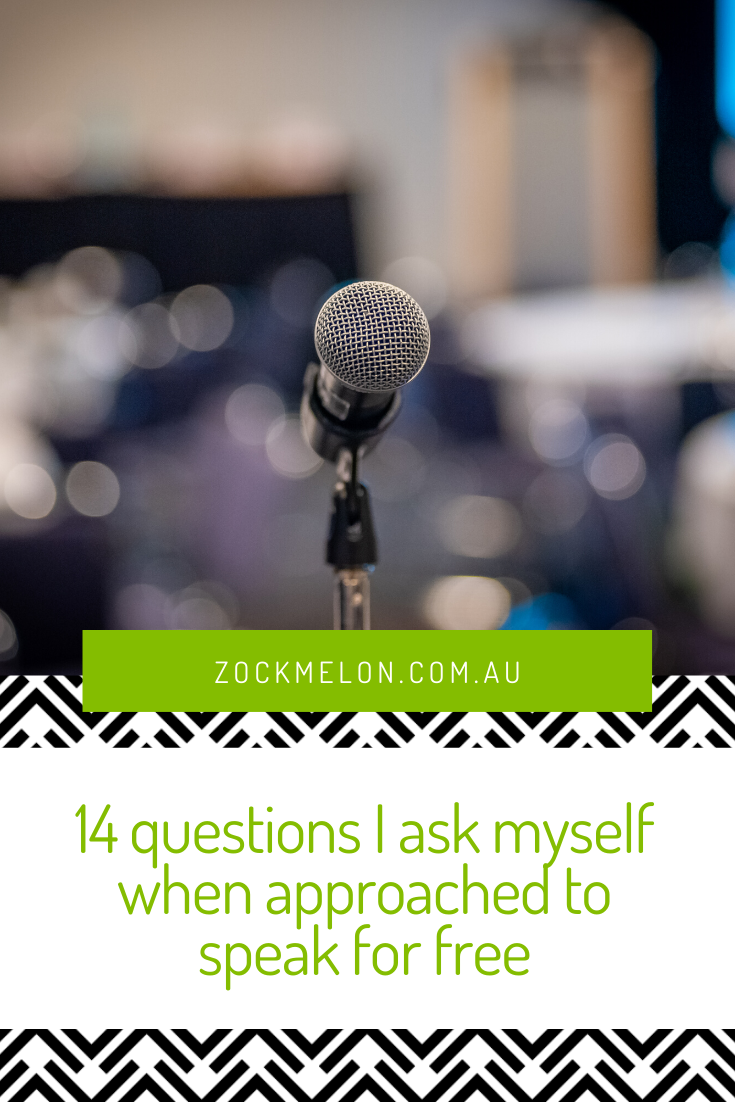By Kristy Schirmer
When I receive an email invitation to speak at a conference or event it always feels like a privilege.
However, the internal deliberations begin usually by the second sentence of the email invitation, at the point where it becomes clear if the offer is an unpaid or paid speaking gig.
Side note — if you are responsible for inviting speakers, please don’t beat around the bush when it comes to money. Be upfront when inviting. If you don’t have any budget for speakers, please let me know this to avoid awkward email conversations. For example, “As this is an unpaid event for our members, we are unable to reimburse you for your speaking time”. Too often I have had to reply just to clarify that it is unpaid, and it’s just uncomfortable for both parties.
It’s not that I say no, it’s that I have to check in with my boundaries and my personal and business goals. I was recently asked, “How do you ascertain your boundaries and your value” when it comes to unpaid speaking offers. I really want to stress that it’s not a hard nor fast decision, but I do ask a series of questions each and every time, and others may find knowing my deliberative process helpful. I also reflect on these questions if it’s a paid offer, in addition to considering how to best provide value to the client and audience.
1. Is this an unpaid speaking event even though it’s paid ticketing for attendees?
This is my biggest peeve. If you’re charging for tickets beyond the amount that would just cover the costs of catering and room hire, it’s reasonable for speakers to be paid something. They are the wholesale product for your event, so you should pay them. Failing to do so makes speakers feel like they are an old side table picked up on hard rubbish day only to be dusted off and sold on Gumtree.
2. Will I have to prepare copious amounts of new content?
I have also asked if I can present a shorter presentation followed by Q&A from the audience which is less preparation work for me and can be more interesting for attendees. Sometimes I’m asked to present on a specific topic which I don’t have a pre-existing slide deck for so I will negotiate to change/edit so it fits something I’ve already developed. Creating new content (unless I’m going to use it again) is far too much work for an unpaid speaking engagement. If new content is created, I will try and repurpose this for something else.
3. Could this lead to other opportunities? Is there an opportunity to network, grow my email list or social media following?
For small workshops, I will ask if I can pass a piece of paper for email sign ups around which helps to grow my database.
4. Is this event easy to get to? Will I need to pay for out of school care or arrange babysitting? How logistically feasible is it for that day/week?
I’m currently on after school pick up and sport/music/homework duties. If I have to be somewhere at 4.30pm it’s actually quite a lot of re-shuffling. Not impossible, but still shuffling is required. In fact, with after-school care costs sometimes speaking for free comes at a financial loss.
5. If I wasn’t at this event, would my time be better used elsewhere?
This is just a simple reflection of opportunity costs which applies to the event itself, but also how much mental/thinking space will the preparation take up.
6. Would accepting devalue other paying clients investment?
If I have charged a normal speaking fee for a similar organisation or event in the past, I am not at all comfortable with then speaking for free. I work in a small sector and I want to show respect to past clients.
7. Am I being asked as the token woman for a panel or speaker line up?
That awkward moment when you’re the token female (or other underrepresented groups) on a panel. It doesn’t feel good, and frankly, it doesn’t look good for the host. Try harder.
8. Are there other speakers whom I want to meet or be seen together with?
Side note to organisers, please let me know who else is speaking so I can connect with them beforehand and make sure we don’t duplicate our presentations. Sometimes it’s also nice to know who is on your speaker list because I will say yes if there’s someone else incredible lined up who I want to rub shoulders with from the stage. I admit I’m much more inclined to say ‘yes’ to a free event if there are people I fan-girl over in the same room.
9. Do I have a gut instinct on whether to accept?
This is usually spot on, my gut knows me well.
10. Is the organisation really unable to pay me?
I also see through pretty quickly if you say you have no budget, but it looks like you’ve got money to spend on other parts of your organisation such as a splashy campaign or upgraded offices. Most of my clients are governments, non-profits or membership-based organisations, but this doesn’t mean they don’t have marketing or professional development budgets.
11. Are there other benefits like recorded video or photos that I can use for my own speaker reel or social media?
These are not normally deal winners for me but are certainly nice to have from any event.
12. Will the organisers share on social media, do they have a relevant and engaged following?
If I know the organisation has a large and/or highly engaged (and relevant to my work) following on social media and will be posting or tweeting, this can also be a nice benefit to working together.
13. Will the organisers be able to promote my website or social media on their page/s in the lead up to the event?
A quality backlink to my website or some sharing on social media are fantastic little bonuses to offset the free speaking.
14. If the event was cancelled at the last minute, would I be disappointed or relieved?
See #9 gut reaction, this is a very effective test!
Finally, before asking these questions, I do reflect on whether I’m the right fit for them and their audience. This applies to paid or unpaid work. Will I provide the audience with value through speaking on topics that are in my zone of genius? If I am the right fit, I’ll consider the questions above in no particular order.
What steps do you take when deciding whether to accept or decline similar offers? I’d love to know!
This article was sparked by a conversation on Chooks SA (a group to address the gender investment gap in startups and social enterprises).

